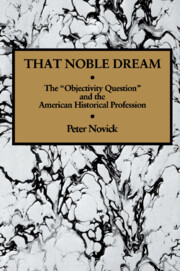Book contents
- Frontmatter
- Contents
- Preface
- Introduction: Nailing jelly to the wall
- I Objectivity enthroned
- II Objectivity besieged
- III Objectivity reconstructed
- IV Objectivity in crisis
- 13 The collapse of comity
- 14 Every group its own historian
- 15 The center does not hold
- 16 There was no king in Israel
- Appendix: Manuscript collections cited
- Index
16 - There was no king in Israel
Published online by Cambridge University Press: 29 March 2011
- Frontmatter
- Contents
- Preface
- Introduction: Nailing jelly to the wall
- I Objectivity enthroned
- II Objectivity besieged
- III Objectivity reconstructed
- IV Objectivity in crisis
- 13 The collapse of comity
- 14 Every group its own historian
- 15 The center does not hold
- 16 There was no king in Israel
- Appendix: Manuscript collections cited
- Index
Summary
Taken together, the developments recounted in the last three chapters constituted a sweeping challenge to the objectivist program of the founding fathers of the historical profession. Ideological disarray replaced the consensus on which ideas of objectivity had always depended so heavily. The resurgence of particularist tendencies further undercut the objectivist vision of a convergent past. Various “postmodern” intellectual currents worked together to chip away at the philosophical foundations of the objectivist posture.
But if the challenge was powerful, resistance was hardly less so. The forces of inertia, combined with sometimes willful obliviousness to the implications of new developments, were very strong. And for many historians, who were all too aware of the threatening consequences of new currents, the chosen response was a circling of the wagons, traditionalist backlash, and reasserting more forcefully than ever the validity of received thoughtways.
History's epistemological crisis was played out against a background of depression which was both material and moral. For members of all academic disciplines, and for historians more than most, the lush years of the sixties were followed by years of famine which seemed likely to last out the century. At the same time there was a widespread sense that the historical profession was coming apart at the seams: that it had become, in William Bouwsma's words, “little more than a congeries of groups, some quite small … which can speak only imperfectly to each other.”
- Type
- Chapter
- Information
- That Noble DreamThe 'Objectivity Question' and the American Historical Profession, pp. 573 - 629Publisher: Cambridge University PressPrint publication year: 1988
- 1
- Cited by

